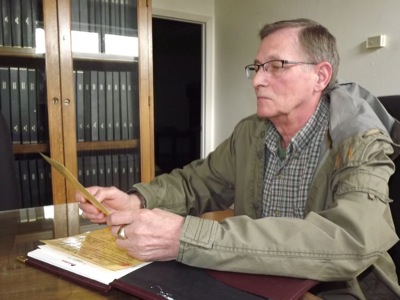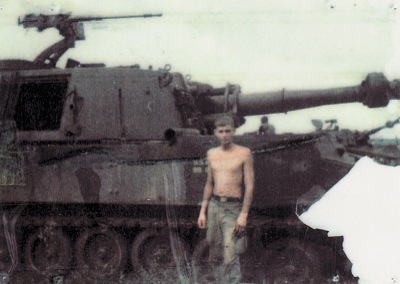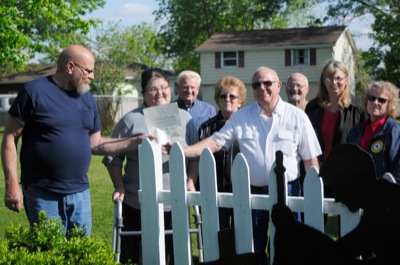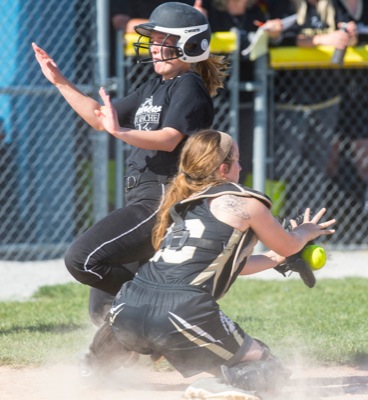Saturday, May 23rd, 2015
Local veteran's war wounds still linger years later
By Shelley Grieshop

Photo by Shelley Grieshop/The Daily Standard
Vern Eichler, Celina, reads one of several telegrams sent to his parents in 1967 to inform them he had been shot in Vietnam and remained on the "very seriously ill" list.
Vern Eichler's life changed forever when he left his hometown in God's country and landed in the jungles of Vietnam.
He will always bear a reminder of the half dozen sniper bullets that ravaged his body and still cause him pain almost 48 years later, he said.
"I just found out a month ago I still have shrapnel in the back of my right thigh," the 67-year-old Celina resident said. "My leg's been numb back there since I was shot. Couldn't figure out why since I was shot on my left side."
One of the armor-piercing bullets apparently had passed through his body and lodged in his right leg. Even after multiple surgeries abroad and in the states, doctors had missed the inch-long piece of metal.
Eichler, a registered surveyor for the Mercer County Engineer's Office, graduated Celina High School in 1966 and on Feb. 13, 1967, was drafted into the Army.
"I was sent to Fort Polk in Louisiana for jungle training," he said. "Right away I knew I was going to Vietnam."
His flight eventually landed in 'Nam where he was greeted by 100-degree heat and deplorable conditions. He and dozens of other soldiers were then crammed into buses that sped past water buffalo and naked kids playing in the dirt, he recalled.
"It reminded me of old movies of Africa. It was like an adventure," Eichler said. "I guess I wasn't thinking at the time I might get killed."
After arriving at the holding center, he was assigned to the 1st Infantry Division. A helicopter took his unit to Phuoc Vinh, the main base camp where he spent just five days of his five-month tour.
"The rest of the time we were in the jungle. I was a grunt, a machine gunner, and we went on search-and-destroy missions all day," Eichler said.
Every other day after supper he and other soldiers were sent to specific positions to set up ambushes for the enemy through the night.
"In the morning we'd come back and start all over," he said.
On Nov. 14, 1967, he and another soldier were chosen by their sergeant to replace two others on an observation post about 100 yards from camp.
"We learned not to go to the same place as the guys we were replacing but there was this brush there - something I never saw before and haven't since - and it was the only place we could go," Eichler said. "At the time I thought, 'This ain't right.' It just didn't feel right."
They weren't in position more than 15 minutes when a sniper hiding in a tunnel of the brush "popped up" and began shooting at them with an AK-47 rifle.
Eichler, just 19 at the time, was repeatedly struck from his shoulder to his mid-section.
The bullets "ripped chunks of meat" from his body, collapsed his lung, damaged his spleen, broke three ribs and caused severe internal injuries, he said.
The other soldier also was seriously injured. The sniper vanished as quickly as he had appeared.
"I grabbed the radio that was on my back and started to yell for help," Eichler said. "I didn't realize at first it was blown into two pieces."
He started to run, took several steps and fell.
"Blood was gushing out of me. I landed on my side ... I remember saying, 'God damn, I'm going to die,' " he recalled.
After yelling for a paramedic, the injured soldiers were finally hauled back to the safe perimeter. The injury to his lung left him gasping for air and prompted an emergency tracheotomy.
"I heard an officer say 'He's going to die,' " Eichler said.
Fortunately, a chopper had just landed to drop off several soldiers. He and others were loaded onto the aircraft and flown to a field hospital. Later, he was taken to a hospital in Vietnam.
"I remember going through the ER doors. That's the last thing I remember," he said.
He was unconscious the first few days of his monthlong stay at the hospital.
"I wasn't supposed to live, they said. I had lost so much blood. I had a high fever and almost died," he said.
He later was transferred to a hospital in Tokyo then a medical facility in Valley Forge, Pa.
"I couldn't hardly walk for a long time," he remembered.
When his doctor finally announced it was time to go home, he was hesitant. Eichler became emotional as he pondered his thoughts at that time.
"I felt ashamed, a failure," he said.
His parents never asked him about the shooting, he said. His girlfriend, now his wife, Marie, over time learned about the ordeal, he said.
"I'm surprised she married me knowing how screwed up I was," Eichler said with a smile.
He was home for about 30 days before he headed back to a VA hospital for nearly 10 months of multiple surgeries and rehabilitation.
He thought about going to college after his October 1968 discharge but didn't want to face the war protesters on most campuses. He eventually got a degree in architectural engineering from ITT.
Less than a decade after getting shot, Eichler began suffering severe migraines, likely from exposure to Agent Orange or the trauma of the shooting, he suspects.
He told the newspaper that fighting for his country felt like a duty at the time, just as his father felt serving in World War II.
"Now I see how it screwed up a lot of guys ... a lot of people died in Vietnam for nothing, just like (war) today," he said. "It's all so political."
More than 58,000 men and women died while serving in the controversial war. Another 75,000 were left disabled.
The shrapnel he still carries inside him can't be removed and neither can the memories that haunt him, he said.
"Every time I take a shower I see the scars ... It's always a reminder. It doesn't go away," he said.
How to obtain veterans' ID cards:
What: Veterans' Document Identification Cards
Where: Mercer County Recorder's Office
Cost: $1
The recorder's office recently acquired equipment to produce the photo ID cards for honorably discharged veterans who record their military discharge information. Each card contains military service dates, a personal discharge document number and other data.
The cards can be used for veteran ID purposes, as well as numerous discounts on services and products at participating retail stores and restaurants.
To obtain a card, veterans must present one form of current and valid identification. Accepted forms include,
• state-issued motor vehicle operator's license.
• an original or certified birth certificate.
• identification card issued by the U.S. Department of Veterans Affairs.
• U.S. military identification card.
• Social Security card.
• state-issued license or permit to carry a concealed weapon.
• state-issued identification card.
• valid U.S. passport.
Business hours for the recorder's office are 8:30 a.m.–5 p.m. Monday, and 8:30 a.m.-4 p.m. Tuesday-Friday.

Submitted Photo
Eichler at age 19 stands in front of an Army tank while stationed in Phuoc Vinh, Vietnam, in 1967. Several months later he and another soldier were were shot several times by a Viet Cong sniper while assigned to an observation post in the jungle.




